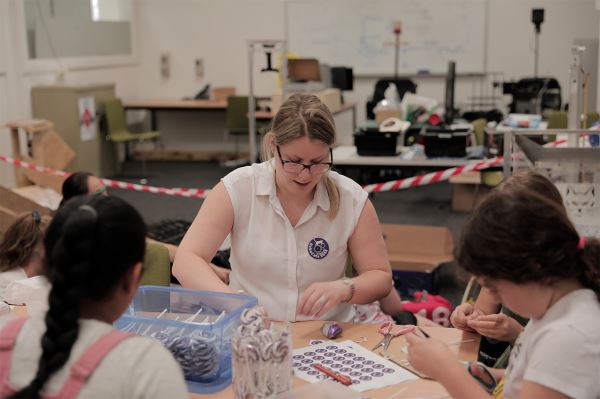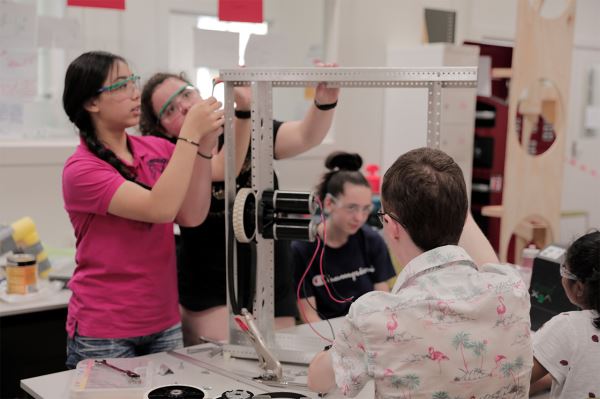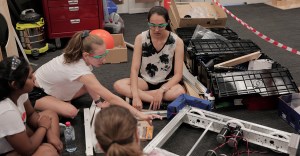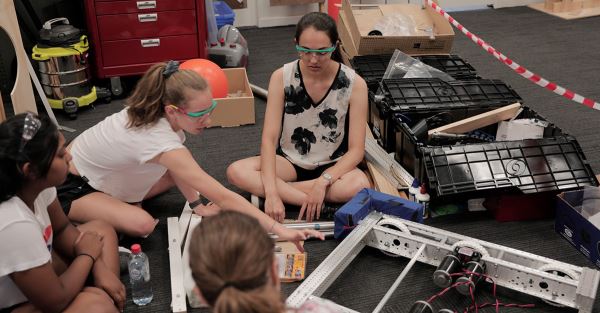The RoboCats are a Swinburne University-based robotics team, made up exclusively of 14 to 18-year-old girls from across Melbourne.
The team competes in the FIRST Robotics Competition to be held in Sydney this week.
The competition brings together high school students, mentors and coaches to build robots that perform in a competitive but fun environment against teams from all over the world.
Combining the excitement of sport with the rigors of science and technology, the teams work over a six-week period to build game-playing robots that weigh up to 57kg.
In this article, Swinburne’s Kaitlyn Blanchard profiles four of the mentors guiding the RoboCats team.
Each mentor shares how they’re helping the team build a robot named “Valentina” for this year’s competition. At the same time they are encouraging more girls to participate in science, technology, engineering and mathematics (STEM).
Becoming a mentor
Before she became a mentor to the RoboCats, biomedical engineering student Paloma Lione, was first a member of the team.
“Throughout high school I was very interested in STEM, so one of my teachers would always tell me about any related programs or events,” Paloma says.
“She mentioned the Robocats and it sounded much more fun than any other STEM program I had participated in, so I joined!”
Engineering graduate, Devon Boyd has also been involved with the RoboCats for a while now.
He began mentoring the team in 2015 – their inaugural year – when they were based at his former high school.
When the RoboCats moved to Swinburne, it was perfect for Devon who was already doing a double degree in engineering and computer science, majoring in robotics and mechatronics, at the university.
Aspiring high school science teacher
Stephanie Jupp and Eamonn Field are newer to the team, both only joining the team this year.
As an aspiring high school science teacher, Stephanie was encouraged by her faculty to get involved.
“I chose to undertake a double degree in secondary education and science because I wanted to combine my interest in science with my passion for teaching,” she says.

Stephanie wants to combine her love of science and teaching by becoming a science teacher.
“Mentoring the RoboCats allows me to get in experience in both.”
Studying network design, Eamonn was invited to mentor the RoboCats after he volunteered at the FIRST Lego League competition in 2018.
“I really enjoyed the experience, so I asked if there were any other related events I could help with,” he says.
“At the time I didn’t know much about the RoboCats, but I was assured it would be a great experience, and when I saw the size of the robot they were going to be building I couldn’t resist!”
To participate in the FIRST Robotics Competition the RoboCats need to work together to design, build, program and learn to drive their very own robot based on the year’s theme.
This year’s theme for the competition is Destination: Deep Space, to celebrate the 50thanniversary of the first moon landing.
Adding to the challenge, the team has only six weeks to create the robot, which can stand up to 6-feet (182 cm) tall and weigh as much as 50 kg.
“It’s a big task, but the girls have been able to manage it very well all while, most importantly, having fun,” says Stephanie.
As mentors, Eamonn, Stephanie and Paloma say it is their role to guide and support the girls throughout the build and all the way to the competition.
This includes project management duties such as ensuring the team is on and track and everyone is contributing, as well as sharing their skills and knowledge to help them develop ideas and a game strategy.

Caption: Eamonn says the RoboCats is more about the girls learning and having fun than just winning.
“There are some teams where the mentors essentially do everything and although it makes
a cool robot, it isn’t very enjoyable for the actual team members,” says Eamonn.
“The RoboCats are different. The idea is to have the girls do as much as possible, making it more about learning and having fun instead of just a laser focus on winning.”
Since beginning full-time work, Devon unfortunately can’t dedicate as much time to the RoboCats but still helps out where he can.
This year, he has been using his experience to help with knowledge of the rules and the feasibility of the girls’ ideas.
Encouraging girls in STEM
While some progress has been made, STEM fields are still largely dominated by men, says Paloma.
This is something she experiences first hand, often being one of the only girls in her classes.
“I look around in my lectures, and I don’t see many girls,” she says.
“However this shouldn’t deter girls from choosing to study a STEM field.”
The RoboCats’ mentors are helping to get more girls involved in STEM.
“The best part about being a mentor is getting girls excited about participating in STEM,” says Eamonn.
“It’s awesome to see their enthusiasm about building a robot, and to know you’ve helped foster that.”
So, what’s their advice for girls who are interested in STEM?
“Talk about your interests with your parents and your teachers so they can help you seek out related opportunities,” says Stephanie.
“There has been an increase in opportunities targeted at girls, but unfortunately many of them exist outside of the school system, so it’s important to speak up.”
“I also think many young girls are afraid of being the only girl participating in an activity, but they shouldn’t be. Just give it a go!”
Best of luck to the RoboCats who will be competing at the FIRST Robotics Competition at Sydney Olympic Park, March 15 -17.
To learn more about the RoboCats and this year’s competition visit their website.


